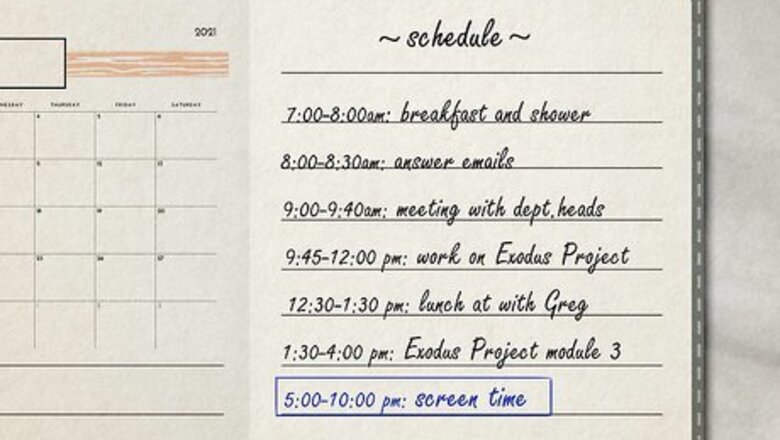
views
Set daily times where you’re available.
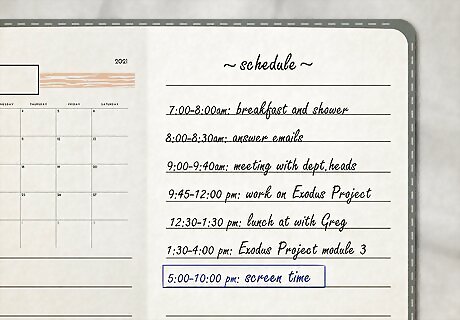
Give yourself set hours to relieve the pressure of replying right away. Make a clear schedule each day for when you check your messages and are available to have a conversation. It’s okay to read the texts you get during your downtime, but don’t respond to them until you're scheduled. Let anyone who would try to contact you know about your availability so they’re less likely to disturb you in the future. For example, you may tell your friends that you can respond between 5 PM and 10 PM after you finish work and before you go to bed. You might also refuse to text during mealtimes or family gatherings so you can focus on the people you’re with. These boundaries work especially well for letting coworkers or employers know that you won’t respond to them outside of work hours.
Use screen time limits for your app usage.
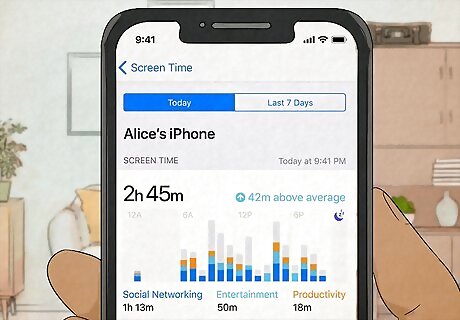
Change your settings so you can't use apps when you run out of time. Check the Parental Control settings on your phone and search for an option called “Screen Time” on an iPhone or “Digital Wellbeing” on an Android. Set a time limit for how long you can use your messaging apps and save your settings. Once you run out of time, you won’t be able to access the apps until the next day. Even though it might stress you out a little not to have access to your messages, remember that it’s okay not to respond right away. If there was an urgent issue, someone can always call you. Set a PIN so it’s harder for you to go in and adjust your settings. If you’re worried you’ll turn off the time limits, ask a friend or family member to choose a PIN instead.
Keep your phone away from you when you’re focusing.

Stop the temptation to check your phone by leaving it somewhere else. Try to keep your phone out of sight whenever you’re working or need to get something done. You could store it in a drawer, put it on a different table, or leave it in another room. That way, you’re less likely to pick it up and check your notifications throughout the day. Even turning your phone off and leaving it nearby can be a distraction. It might feel a little strange not having your phone near you at first, but it really helps you feel less stress and pressure to check and respond to messages.
Put your phone in another room before bedtime.

Limiting your phone use at night keeps you from staying up late texting. Chatting into the wee hours of the morning could affect your sleep and make you feel burnt out the next day. Rather than keeping your phone near your bed, keep it somewhere else so you’re not tempted to check it. Anyone trying to reach you late at night will understand that you’re trying to sleep and you can always respond the next morning. Get an actual alarm clock if you normally use your phone to wake up in the morning. Try finding a replacement for browsing your phone at night. For example, you can try reading or journaling before bed to distract yourself from using your phone. When you wake up, avoid going directly on your phone. Give yourself a little bit of time to wake up and start the morning on a good note.
Tell your friends and family your boundaries as soon as possible.
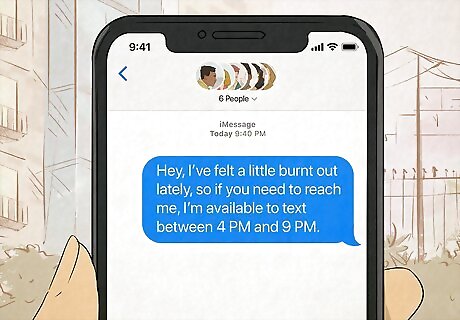
The earlier you mention your boundaries, the less conflict you’ll have later. If you have friends that reach out while you’re at work or send a lot of messages throughout the day, talk to them about your boundaries. Tell them the times where you’re available to communicate and that you won’t be able to hold a full conversation outside of those times. Let them know it’s okay for them to text you still, but that they should only expect responses during the times you set. For example, you could say, “Hey, I’ve felt a little burnt out lately, so if you need to reach me, I’m available to text between 4 PM and 9 PM.” It’s really important to communicate your boundaries so people who reach out to you don’t feel like they’re ignored.
Be consistent with your boundaries.

Changing your boundaries can be tough, so keep reinforcing them. It can be really challenging for everyone to get used to your boundaries, and some people may not follow through with them right away. Even though you may still get a lot of text messages, stick to the limits you set for yourself so you don’t stress yourself out or feel the need to reply. Otherwise, if you keep responding when you said you’re unavailable, other people might be confused or get mixed messages. Cut some slack to the people texting you at first, but give them a gentle reminder that you’re not available. For example, during your available hours, you may reply, “Hi! Just a reminder that I’m only responding to texts after 5 PM when I finish work.” Even though you probably want to respond right away, ask yourself if the message requires a reply right away. If it’s casual chit-chat, you can leave it until the times you’re available.
Send a quick response saying you can’t talk right now.
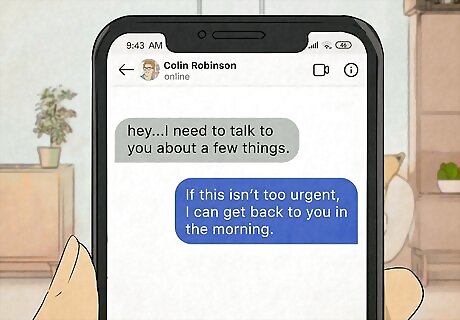
Acknowledge the message to let the person know you’ve seen it. This works especially well right after you’ve established new boundaries. If you’re busy or someone keeps messaging you during your downtime, you can send something short to let them know you’re not completely ignoring them. That way, you let them know you’re not immediately available, but you’re willing to talk to them a bit later. For example, you could say, “Hey, I’m a little busy at the moment, but I’ll take a closer look at this in a few hours if that’s okay.” As another example, you might reply, “If this isn’t too urgent, I can get back to you in the morning.”
Offer a different time when you’re available.

Give alternative times so the person knows you still care about them. If you’re really busy with another task or just need a break to disconnect for a while, let the person know when they can best reach you. Pick a new time that doesn’t conflict with your boundaries so you can have the conversation later on. For example, you could say, “I’m not available right now, but could I get back to you around 6 tonight?” As another example, you could say, “I’m not in a great mood tonight, so could we talk about this tomorrow?” Have the person check in with you before a heavy conversation. For example, you could ask them to send a message that reads, “Are you available right now to talk about a heavy topic?”
Ask to talk over the phone or in person.

If you’d rather not have a conversation over text, tell the person. Texting can be a really tough medium to convey emotions, so it’s usually not the best for difficult topics. If you’d rather hear the person’s voice or talk in person, suggest it over text so you can plan a better time to discuss everything. For example, you might say, “This sounds like an important conversation. Can I call you when I finish work today?” As another example, you could say, “Would you mind if we chatted about this in person? I’m a little busy and don’t want to misread anything.” You could even switch to emails instead of texts since there isn’t as much of an expectation to respond right away.
Let others know when you need a break.
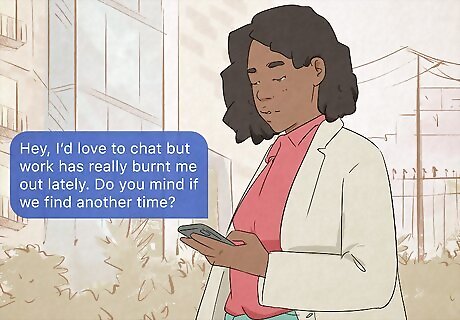
Open up when you’re stressed so people aren’t expecting replies. It’s perfectly okay to take some time to disconnect if you feel overwhelmed or stressed out. Communicate how you’re feeling to the person reaching out to you if you’re not in a good headspace to text them. Let them know that you want to have the conversation but at a later time so they don’t feel like you’re ignoring them. For example, you might say, “Hey, I’d love to chat but work has really burnt me out lately. Do you mind if we find another time?”
Encourage the person to find another form of support.

See if the person can talk to anyone else if you’re not emotionally available. It can be draining if someone always comes to you with their issues, so ask them to reach out to other people. You could suggest that they find another friend or family member to chat with. If you’re close with the person, you could even recommend that they find a professional therapist so they can work through what they need to. For example, you could ask, “This sounds like a really important topic, but I’m busy at the moment. Is there someone else that might be able to help?”
Mute the person if they don’t respect your boundaries.
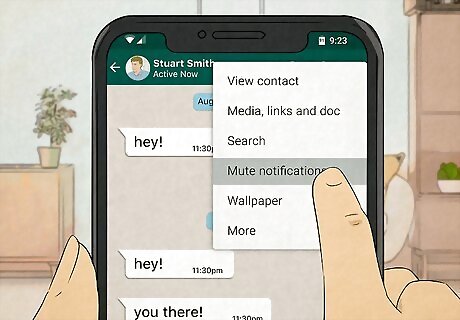
Don’t hesitate to cut off communication if they still won’t listen. Some people may not understand your boundaries no matter how often you remind them. If you’re still bombarded with messages throughout the day, mute the person or turn off notifications from the app they use so you don’t get notified. Avoid responding to them so you can pull yourself out of a stressful situation. You could even turn your phone off to let the person know that you’re really unavailable to talk.


















Comments
0 comment